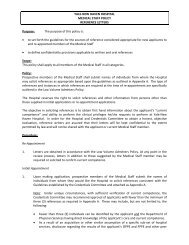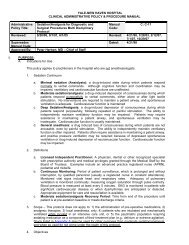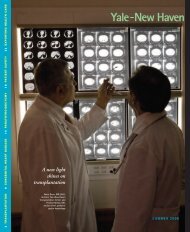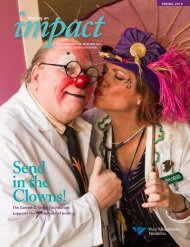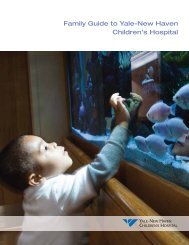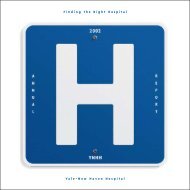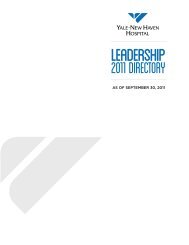Nursing Update 2009 - 2010 - Yale-New Haven Hospital
Nursing Update 2009 - 2010 - Yale-New Haven Hospital
Nursing Update 2009 - 2010 - Yale-New Haven Hospital
- TAGS
- nursing
- haven
- www.ynhh.org
You also want an ePaper? Increase the reach of your titles
YUMPU automatically turns print PDFs into web optimized ePapers that Google loves.
new knowLeDge,<br />
InnoVATIons AnD ImProVemenTs<br />
nurses trained in Pedi eD<br />
to use intraosseous tool<br />
to inject into marrow<br />
Nurses in <strong>Yale</strong>-<strong>New</strong> <strong>Haven</strong> Children’s<br />
<strong>Hospital</strong>’s Pediatric Emergency Department<br />
and Pediatric Intensive Care Unit are<br />
now equipped with a palm-sized tool that<br />
allows them to deliver intraosseous drugs<br />
and fluids quickly and safely to a patient<br />
through the marrow, if vascular access<br />
is not available. Nurses in both departments<br />
have been trained to use the EZ-IO<br />
intraosseous power driver, a drill-like<br />
tool that provides emergent intravenous<br />
access in less than 10 seconds and has<br />
proven to be a safe and effective alternative<br />
to intravenous access for the patient.<br />
“Paramedics and EMTs have used this<br />
tool pre-hospital for several years, but it<br />
is a relatively new practice for nurses,”<br />
comments Denine Baxter, RN, patient<br />
services manager, Pediatric ED. “This<br />
safe and reliable tool provides us with an<br />
alternative method of delivering drugs<br />
and fluid when timing is critical for our<br />
young patients.”<br />
Ynhh nurses conduct<br />
range of vital research<br />
<strong>Yale</strong>-<strong>New</strong> <strong>Haven</strong> <strong>Hospital</strong> is committed to<br />
supporting nursing research as a means<br />
to generate new knowledge, promote innovations<br />
in nursing practice and improve<br />
the quality of care. The hospital’s <strong>Nursing</strong><br />
Research Committee, established in 2007,<br />
provides the ongoing research support<br />
needed by staff. The committee matches<br />
nurses with research mentors who guide<br />
them through every phase of the process.<br />
Nurses of varied backgrounds and<br />
tenure have developed research projects<br />
1 2 n u r s I n g u P D A T e<br />
based on questions arising from clinical<br />
practice, nursing and patient education,<br />
health policy, nursing administration or<br />
informatics.<br />
Currently, 18 teams are in various phases<br />
of conducting studies in several clinical<br />
settings. Some of the studies include: use<br />
of an internet-based medication tool that<br />
reduces medication errors in kidney and<br />
liver transplant patients; accuracy of chemstrips<br />
for screening urine prior to chemotherapy<br />
in children; ambulating patients<br />
with pulmonary artery catheters who are<br />
waiting for heart transplant; and a study of<br />
inadvertent hypothermia in adult patients<br />
undergoing interventional radiologic<br />
procedures.<br />
“YNHH is committed to supporting the<br />
scientific inquiry of its nursing staff and<br />
is always looking for ways to increase the<br />
number of studies conducted here,” said<br />
Janet Parkosewich, RN, DNSc, interim<br />
nurse researcher.<br />
hospital introduces<br />
therapeutic hypothermia<br />
into eD<br />
With research supporting the effectiveness<br />
of slowing down brain metabolism<br />
in patients who remain unconscious<br />
after suffering cardiac arrest, YNHH’s<br />
critical care team began providing<br />
therapeutic hypothermia treatment last<br />
year. Arctic Sun is a non-invasive device<br />
that delivers this therapy using waterfilled<br />
hydrogel pads that are applied<br />
directly to the patient’s back, chest and<br />
thighs to lower the body temperature and<br />
maintain it at 91.4° F. Unit-based nurse<br />
educators led the education efforts for<br />
the Arctic Sun equipment and the<br />
Inadvertent hypothermia in<br />
adults undergoing interventional<br />
radiology procedures with<br />
moderate sedation/analgesia<br />
Twenty-five patients participated in this pilot<br />
study. Results demonstrated a wide variation in<br />
temperatures. Mean temperature was 98.54° F<br />
pre-procedure, immediately post-procedure, it<br />
was 98.43° F, whereas temperature in the recovery<br />
area was 98.26° F. Twenty percent of the patients<br />
reported feeling cold immediately post-procedure,<br />
and 28 percent felt cold in the recovery area. Of<br />
those denying thermal discomfort, 75 percent had a<br />
temperature decrease immediately post-procedure,<br />
whereas 69 percent experienced a temperature<br />
decrease in the recovery area.<br />
Percentage not cold<br />
100<br />
90<br />
80<br />
70<br />
60<br />
50<br />
40<br />
30<br />
20<br />
10<br />
0<br />
75%<br />
Immediately<br />
Post-Procedure<br />
69%<br />
Recovery<br />
area


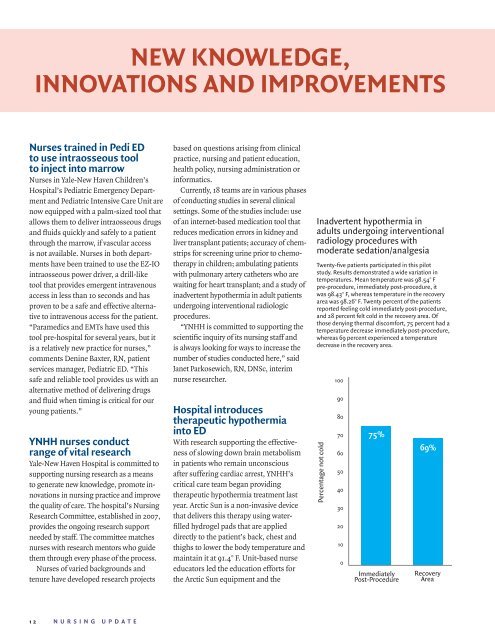
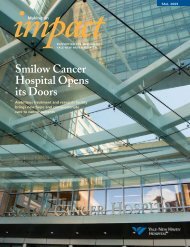

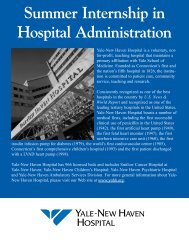
![Annual Report Donor Listings [pdf] - Yale-New Haven Hospital](https://img.yumpu.com/49673575/1/190x245/annual-report-donor-listings-pdf-yale-new-haven-hospital.jpg?quality=85)

